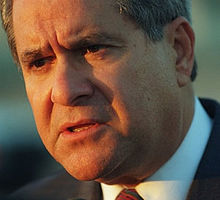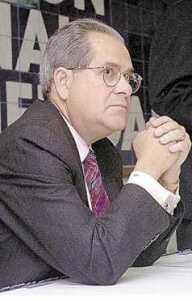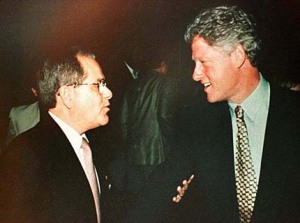 Jorge Mas Canosa (1939–1997) was a Cuban American immigrant who founded the Cuban-American National Foundation and MasTec, a publicly traded company. He was regarded within the US as an effective lobbyist on Cuban and anti-Castro political positions.
Jorge Mas Canosa (1939–1997) was a Cuban American immigrant who founded the Cuban-American National Foundation and MasTec, a publicly traded company. He was regarded within the US as an effective lobbyist on Cuban and anti-Castro political positions.
Jorge Mas Canosa was born into a middle-class family in Santiago de Cuba, Cuba on Sept. 21, 1939. He was a mason, and since an early age, he was outspoken about his oppositions to dictatorships and was persecuted and imprisoned for his views Fidel Castro regime. After expressing his views about Castro, Mas Canosa was forced into exile and arrived in Miami, Florida.
At the age of fifteen, Mas Canosa spoke out against Batista’s dictatorship and was briefly imprisoned. Released into his father’s custody (Jorge Mas Cayado, veterinary commander in Cuba’s army), his family sent him to the Presbyterian Junior College in Maxton, North Carolina. There, Mas Canosa learned English and studied the political philosophy of Thomas Jefferson and Thomas Paine, which would influence his outlook in the years to come.
Mas Canosa returned to Santiago to study law at the University of Oriente when the Batista regime was overthrown. As soon as he decided that Castro’s new government was undemocratic in nature, Mas Canosa resumed his political activism. He was forced into exile under threat of arrest and arrived in Miami.
Business.
As an exile, Mas Canosa was active in his new community. As soon as he arrived, he worked wherever he could to make ends meet: as a dockworker on the Miami River, washing dishes in hotels on Miami Beach, and delivering milk around town.
In 1961 he joined the Brigade 2506 and participated in the failed Bay of Pigs invasion in April, 1961. He later graduated as Second Lieutenant in the U.S. Army at Fort Benning, Georgia, but ultimately left the military life in pursuit of business ventures.
Church & Tower.
In 1969, Mas Canosa made a deal with the owner of Church & Tower, a floundering and overextended construction firm that constructed and serviced telephone networks. Mas Canosa agreed to focus on saving the company in exchange for half ownership. Managing Miami operations, he used his growing reputation in the exile community to secure lines of credit and was ultimately able to optimize his workers’ construction methods and increase the company’s productivity. The company grew from South Miami to Ft. Lauderdale with $40 million in annual revenues in 1980.
Cuban American National Foundation.
In 1981, Mas Canosa, along with Raul Masvidal and Carlos Salman, established the Cuban American National Foundation (CANF), at the suggestion of Richard Allen, Ronald Reagan’s National Security Advisor, and Mario Elgarresta, a member of Allen’s staff. The group was founded as part of a broader strategy to sideline more moderate perspectives within the Cuban-American community, and to convert anti-Castro activism from a more militant to a more political strategy.
CANF was widely described during Mas Canosa’s tenure as one of the most powerful ethnic lobbying organizations in the US, and used campaign contributions to advance its policy in Washington, DC.Carter administration officials believed that if not for Mas Canosa, the United States might have ended the Cuban embargo.
Mas Canosa married Irma Santos, his high school sweetheart from Santiago, in Miami, Florida. They had three sons, Jorge Mas, Juan Carlos Mas, and Jose Mas.
Radio and television Martí.
In the early 1980s, Mas Canosa urged President Ronald Reagan to create a radio station aimed at broadcasting news into Cuba. After the station (named Radio Martí, after José Martí) was created, Reagan named Mas Canosa chair of the advisory board of the Office of Cuba Broadcasting, which advised the president on the operation of the station. Station employees later acccused Mas Canosa of interfering with station content, including accusations that he had complained that the stations did not give enough coverage to his personal activities.
MasTec.
Following the incorporation of Mas Canosa’s sons into the business became MasTec, Inc. in 1994 when Jorge Mas led a reverse acquisition by its former competitor, Burnup & Sims.
Today, MasTec, Inc. (NYSE:MTZ) has a $3.6 billion revenue traded network infrastructure contractor employing over 13,000 persons in North America. MasTec is a leader in six distinct business lines. Power Generation and Industrial renewable, Natural Gas and Oil Pipeline, Electrical Transmission, Wireless, Wireline Utility Services and DirecTV install to the home.
MasTec is one of the Top five largest Hispanic owned firms in the United States and was the first to reach the $1 billion revenue mark in 1998.
Agencies/Various/Wiki/AV/InternetPhotos/www.thecubanhistory.com
The Cuban History, Hollywood.
Arnoldo Varona, Editor.



 Jorge Mas Canosa, businessman, political activist. (Born: Santiago de Cuba)
Jorge Mas Canosa, businessman, political activist. (Born: Santiago de Cuba)


